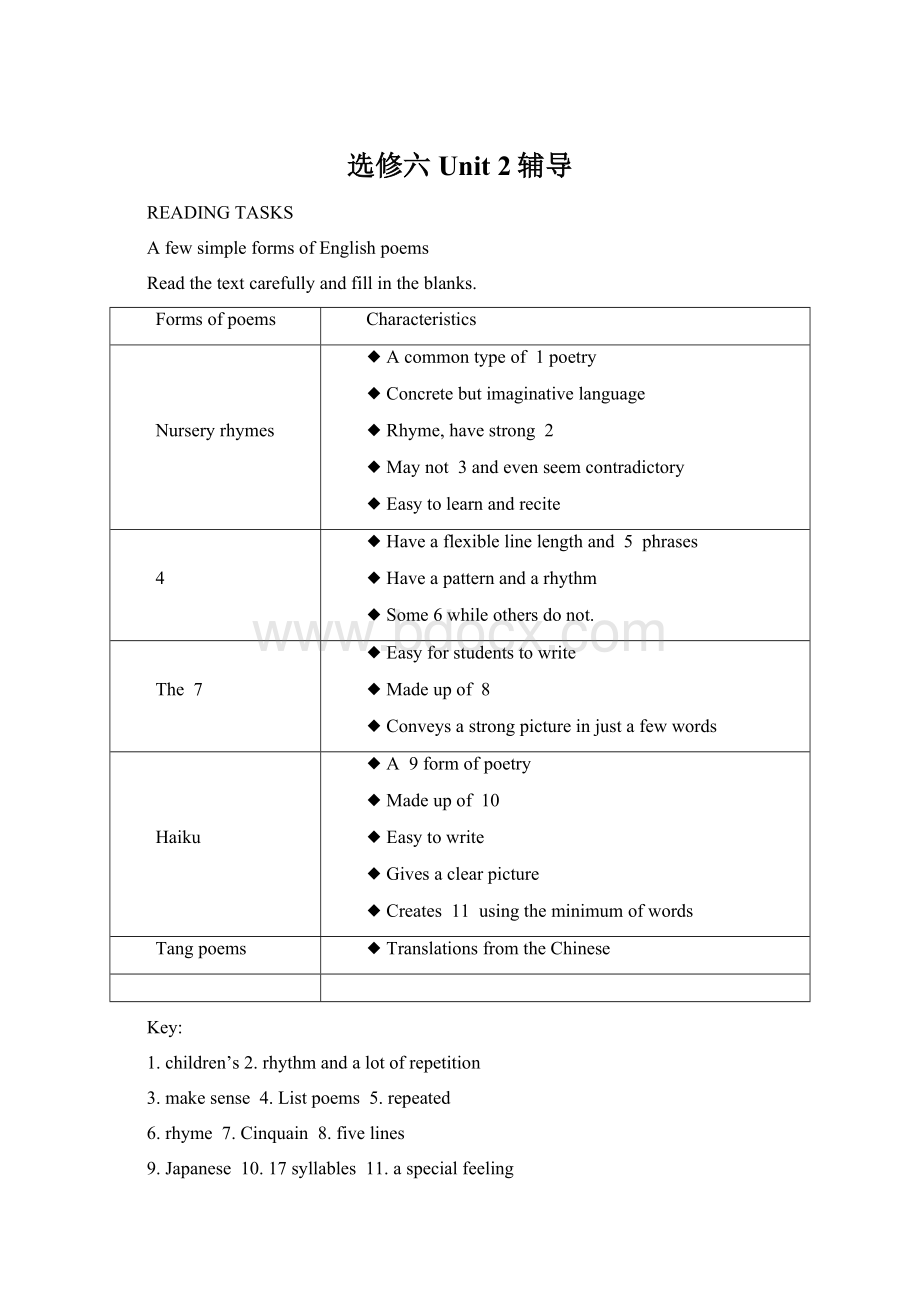选修六 Unit 2辅导Word文件下载.docx
《选修六 Unit 2辅导Word文件下载.docx》由会员分享,可在线阅读,更多相关《选修六 Unit 2辅导Word文件下载.docx(14页珍藏版)》请在冰豆网上搜索。

◆Creates11usingtheminimumofwords
Tangpoems
◆TranslationsfromtheChinese
Key:
1.children’s2.rhythmandalotofrepetition
3.makesense4.Listpoems5.repeated
6.rhyme7.Cinquain8.fivelines
9.Japanese10.17syllables11.aspecialfeeling
GRAMMAR
虚拟语气(下)
[想一想]请观察下列几组句子,想一想其中谓语动词的用法有何特点。
1.a.Hesuggestedthatwe(should)putoffthesportsmeetingtillnextmonth.
b.Itisrequiredthatallofus(should)bepresentatthemeeting.
c.Thedoctor’ssuggestionisthatI(should)stayinbedforanotherthreedays.
2.a.Johnwantstoseemetoday,butIwouldratherhecametomorrow.
b.NowIregretgoingtothecinemawithhim.IwouldratherthatIhadstayedathome.
3.a.Itishightimethatwetookmeasurestoprotecttheseendangeredanimals.
b.Itistimethatyoumadeupyourmind.
4.a.Ifonlytherainwouldstop!
b.IfonlyIhadn’ttoldthenewstoMary,everythingwouldhavebeenallright.
5.a.Butforyourhelp,wecouldn’thavefinishedtheworkaheadoftime.
b.Withoutthemessage,Iwouldnothavefoundthelostcomputer.
c.I’mgladIwentoverallmynotes;
otherwiseIcouldn’thavedonesowellintheexam.
d.Supposetheydidnotbelievehim,whatwouldtheydotohim?
6.a.Ifyouhadtakenmyadvice,youwouldn’tbeinsuchtroublenow.
b.Ifhehadbeentryinghard,hisparentswouldn’tbesoworried.
7.a.Longlivepeace!
b.Mayyouenjoymanyyearsofhealthandhappiness!
c.Godblessyou!
[讲一讲]通过观察、分析以上几组例句,我们可以发现与之相对应的虚拟语气用法原则:
*在表示请求、建议、要求、命令的名词性从句中,谓语用should+动词原形或只用动词原形。
如第1组例句。
*在wouldrather后的宾语从句中,谓语常用一般过去时表示对现在或将来情况的虚拟;
谓语用过去完成时表示对过去情况的虚拟。
如第2组例句。
*在Itis(high,about)time后的定语从句中,谓语要用虚拟语气(多用过去式)。
如第3组例句。
*ifonly(但愿、要是……就好了)主要用在虚拟语气中,用以表达愿望或非真实条件,谓语用过去的某种时态。
如第4组例句。
*虚拟的条件有时可以不用条件从句来表示,而通过某些介词短语、副词等来表达。
常用来表示含蓄虚拟条件的词或短语有without,butfor(要不是),or,otherwise等。
如第5组例句。
*有时,条件句谓语和主句谓语表示的动作在时间上并不一致,这类句子称为错综时间条件句。
如第6组例句。
*在一些表示祝愿的话语中用虚拟语气(多用动词原形)。
如第7组例句。
[练一练]用括号内所给动词的适当形式填空。
1.Thedoctorsuggestedthathe_____(try)toloseweightinordertokeepfit.
2.I’dratheryou_____(stay)athomeand_____(keep)mecompanythisevening.
3.Iamfeelingterriblenow.IfonlyI_____(follow)thedoctor’sadvice!
4.Weallagreethatitishightimewe_____(put)anendtothediscussion.
5.Itisrequiredthattheproblem_____(solve)withintheweek.
6.Youshouldn’thavetoldhimthenews.Iwouldratheryou_____(notdo)that.
7.Theoldprofessorgavetheorderthattheexperiment_____(complete)before6.
8.Butforyourhelp,we_____(stillbe)busyworkingontheprojectnow.
9.Maytherenever_____(be)anotherworldwar!
10.Theexpressiononthemanager’sfacesuggeststhathe_____(be)veryangry,soIsuggestthatyou_____(come)someotherday.
1.(should)try2.stayed;
kept3.hadfollowed
4.put5.(should)besolved6.hadnotdone
7.(should)becompleted8.wouldstillbe
9.be10.is;
(should)come
rhyme和rhythm
Q1:
rhyme和rhythm分别指什么?
A:
Rhymeistheuseofwordsinapoemorsongthathavethesamesound,especiallyattheendsoflines.汉语意为“韵;
押韵”。
如:
Boldandcoldarerhymes.bold和cold是同韵词。
Rhythmisastrongregularrepeatedpatternofsoundsormovements.汉语意为“节奏;
韵律”。
Shecan’thelpdancingtotherhythmofthemusic.她情不自禁地随着音乐的节奏跳舞。
Q2:
请问“I’mnotgoingtoenterapoemthisyear.”(P15),“Imaginethatyourclasshastoenterpoemsinacompetitionnextweek.”(P16)这两句中的enter的意思一样吗?
这两句中的enter的意思一样,都意为“使参加”,即:
使诗歌参加比赛。
HeenteredalandscapepaintingintheExposition.他把一幅风景画送展览会展出。
runoutof
runoutof意为“用完”,主语只能是人。
Hehasrunoutofredink.
他的红墨水用完了。
Werunoutofcoal,andhadtoburnwood.
我们的煤用完了,所以不得不烧柴。
Ifwerunoutofmoney,wecansellsomeoftheproductsinGuangzhou.
如果我们的钱用完了,可以在广州卖掉一些产品。
[比较]runout和runoutof这两个短语都有“用完”的意思,但用法不同。
runout作不及物短语,表示“被用完;
被耗尽;
(人)把东西用完(或花光)”,其主语通常是时间、金钱、食物等无生命名词,而runoutof则是及物短语,表示主动。
[例句]Hisstrengthranout.
他的力气用完了。
[小试]根据括号内的汉语提示完成下列句子。
1.Foodsupplies_____________(已经吃完了)bytheendoftheirlasttrip.
2.Whatifyouwereto_____________(花完)money?
Whatwouldyoudo?
3.Theyare_____________(消耗尽)oilandtheplanehastolandonthefield.
4.Ifwe_____________(没有用完)sugar,Iwouldn’thavegonetotheshops.
1.hadrunout2.runoutof
3.runningoutof4.hadn’trunoutof
“传达”convey
★作“传达;
表达(思想或感情等)”讲时,常用于conveysth.tosb.结构。
Colourslikeredconveyasenseofenergyandstrength.
红色之类的颜色可以给人以充满活力和力量的感觉。
Agoodphotographcanoftenconveyfarmorethanwords.
一张好照片常常能够比话语表达更多的含义。
Pleaseconveymythankstoyourwife.
请向你的妻子转达我的谢意。
★作“传送;
运送;
输送”讲时,常用于conveysb./sth.(from...)(to...)结构。
Awireconveysanelectriccurrent.导线输送电流。
Ataxiconveyedustothetrainstation.
一辆出租车将我们载到火车站。
Pipesconveyhotwaterfromtheboilertotheradiators.
管道把热水从锅炉输送到暖气片。
[联想]conveyer/conveyorn.运送者;
传达者
[小试]将下列句子翻译成英语。
1.一辆公共汽车把旅客从火车站送到飞机场。
2.他知道如何向观众传达信息。
1.Abusconveyspassengersfromthetrainstationtotheairport.
2.Heknowshowtoconveythemessagetohisaudience.
EXPRESSIONS
runoutof意为“用完”。
Theyranoutofthecoalbeforethewinterpassedby.
冬季还没有结束,他们就把煤用完了。
Ihadrunoutofallmymoneybeforegettingthesalary.
还没发薪水我的钱就已经用光了。
[辨析]runoutof/runout
runoutof用完。
及物动词短语,表示主动意义,主语一般是人。
runout(某物)被用光,被耗尽。
不及物动词短语,其主语通常为时间、食物、金钱等无生命名词。
Mypatiencehasrunout.
我已经失去了耐心。
Ihaverunoutoftheink./Theinkhasrunout.
我已经用完了墨水。
/墨水用完了。
1.Whatshallwedowhenalltheresourcesintheworld________(用光了)?
2.Aftertwoweeks,we________(用光了)foodandwater.
3.Time________(就快到了).
4.We________(已经喝光了)coffee.
1.haverunout2.ranoutof3.isrunningout
4.haverunoutof
短语训练营
请用方框内短语的适当形式完成下列句子。
takeiteasy;
makeupof;
inparticular;
tryout;
letout
1.Doyouhaveanything________todothisweekend?
2.Thegirl________ascreamofterrorassoonasshesawthemaddog.
3.Thecommittee________eightmembers.
4.Thedoctortoldmeto________forafewweeks.
5.Fathercouldn’twait________hisnewcar.
1.inparticular2.letout3.ismadeupof
4.takeiteasy5.totryout
CHECKINGCORNER
Part1:
WarmingUp&
Pre-reading
根据括号内的汉语提示完成下列句子。
1.Thisformcanbecompleted_____________(或者用英语或者用汉语).Pleasereadthenotesbelowbeforewriting.
2.Theysay_____________(有很多原因)raisingachildshouldbeamother’sfull-timejob.
3.Wouldyouplease_____________(列出)allyourfriendsinthiscity?
4.Canyoufindthe_____________(押韵词)inthispoem?
Part2:
Reading&
Comprehending
I.根据下列各句句意及所给单词的首字母或汉语提示,写出该单词的正确形式。
1.Heclimbedupthetreeandhidamongtheb______.
2.Hecouldn’tjointhepolice,becausehewasbelowthem______heightallowedbytherules.
3.Alampisc______,butitsbrightnessisabstract.
4.Wecaneasilybendapieceofwire;
itisf______.
5.Doyouknowthewomanwhowearsa______(钻石)ringonherlefthand?
6.Pleasecutoutmyovercoataccordingtothis______(式样).
7.Theyliveinacountry______(小屋)withflowersaroundthedoor.
8.Itisn’tararebird,justacommon______(麻雀).
II.用括号内所给单词的适当形式填空。
1.Whatisitthattheauthorwants______(convey)tohisreadersthroughthestory?
2.CouldIhavethedishchanged,please?
It’stoo______(salt).
3.Her______(end)patiencemadeherthebestnurseinthehospital.
4.I’mnotverygoodatEnglish______(translate).
5.Withlove,theworldcanbe______(transform).
6.Heworkedsohardthat______(eventual)hemadehimselfill.
III.用方框内短语的适当形式完成下列句子。
runoutof;
translateinto;
bepopularwith;
takeiteasy;
onfire;
stayup;
ofone’sown;
nurseryrhyme
1.Thechildlikesreading______.
2.Thehousewas______lastnightandwasburneddown.
3.It’swrongforparentstoletthechildren______latetowatchTV.
4.It’snousebeingnervous.______.
5.Ourcar_____gasthreemilesfromthetown.
6.Heisgladtofindthathisnewsong______notonlytheyoungbutalsotheold.
7.Thewholemealwasgoodbutthewine______wasexcellent.
8.Uptonow,hisbook______10foreignlanguages.
9.Bytheway,doyoulivewithyourparentsorhaveaplace______?
Part3:
LearningaboutLanguage
1.Thel______saidthatImighthavethebookIborrowedjustnowfromthelibraryforoneweek.
2.Whenhersonwenttofightinthewar,themotherfeltshe’dsaidgoodbyetohimf______.
3.ThegirlacquiredaHighSchoold______lastyear.
4.Iusuallye______afewwordsofgreetingwithmyneighbourafterbreakfast.
5.Theraceorganizersaretryingtoattract______(赞助者).
6.Hewantstoknowwhenourancestorsinventedthe______(指南针).
7.Relativesandfriendsshoweredgoodwishesonthebrideand______(新郎).
8.Theyhaveheldthe______(冠军称号)forthepastthreeyears.
II.根据括号内的汉语提示完成下列句子。
1.Theyoungladyoperatedthenewly-introducedmachineskillfullyasif_____________(她以前经过培训一样).
2._____________(如果他被警告),hewouldnothavetakenthatpoisonousfood.
3.Hehesitated(犹豫)foramomentbeforekickingtheball,otherwise________